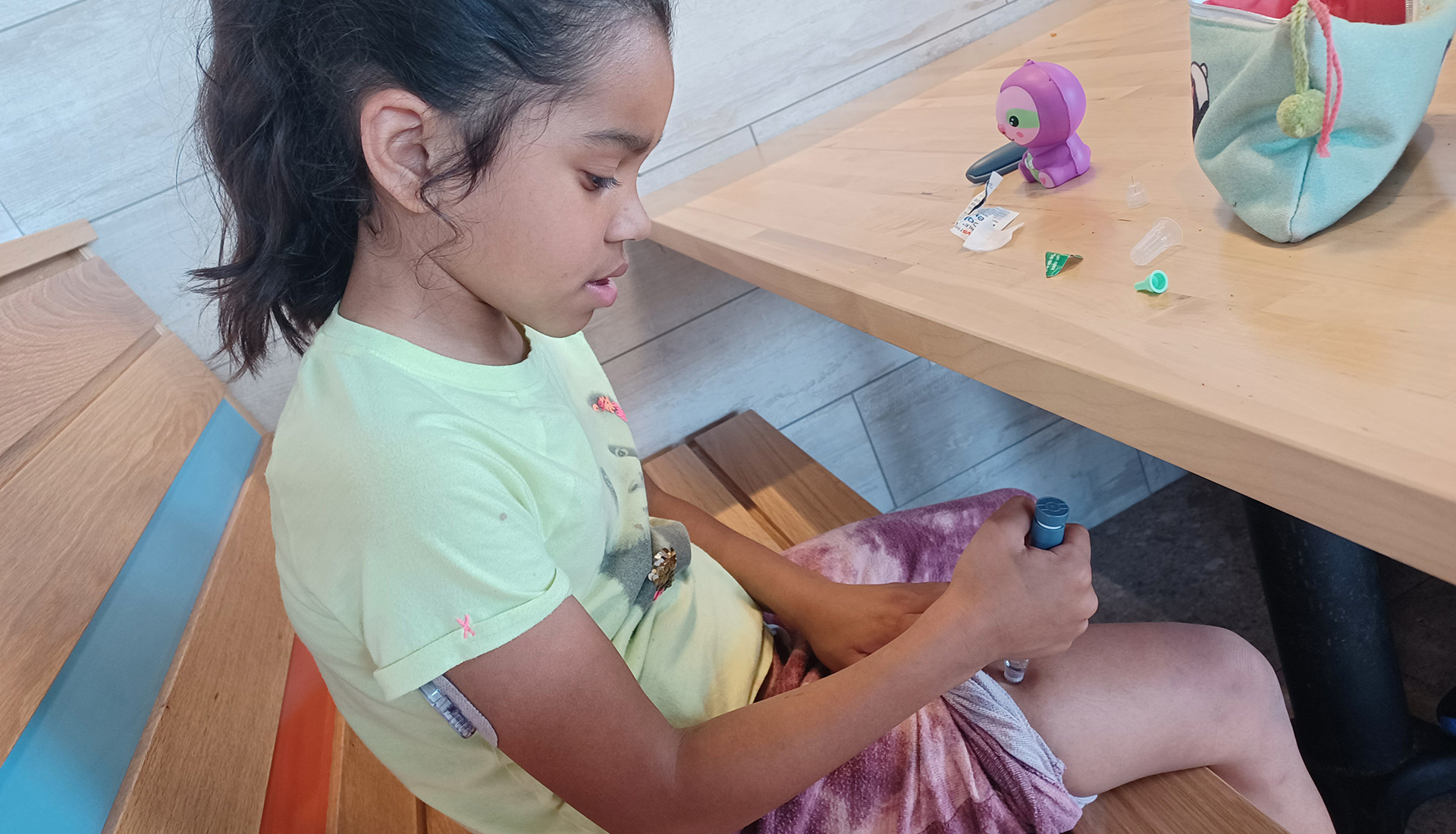

When Annelle Perez, 10, was diagnosed with type 1 diabetes, her parents did not know what to expect.
“It was scary,” Annelle’s mother, Rosarito Rodriguez, said in a video about a program to help parents like her — Hispanic and Black parents of school-aged children with type 1 diabetes.
Funded by the National Institutes of Health, the TEAM (Type 1 Diabetes Empowerment and Management) program was designed to reduce the emotional burden of diabetes, improve social support and help improve outcomes of day-to-day disease management.
Ranked No. 2 in the country among children’s hospitals for 2023-2024 by U.S. News & World Report, Texas Children’s Diabetes and Endocrinology provides diagnosis, treatment and follow-up of children with diabetes and endocrine disorders. The center educates diabetes patients and their families in self-management of all aspects of types 1 and 2 diabetes.
TEAM is part of health equity research led by Ashley Butler, PhD, Clinical Pediatric Psychologist at Texas Children’s Hospital and Associate Professor of Pediatrics-Psychology at Baylor College of Medicine. Dr. Butler’s research:
Previous research found that the number of Hispanic and Black individuals diagnosed with type 1 diabetes is increasing at a much steeper rate than in other racial and ethnic groups. Hispanic and Black children also have poorer outcomes from diabetes than non-Hispanic White children.
“Our diverse environment truly highlights the inequities of care and their impact on disease outcome. Poorer outcomes are reported in a larger proportion for patients with public insurance and those from racial/ethnic minority groups,” said Rona Sonabend, MD, Division Chief of Pediatric Diabetes and Endocrinology, Associate Quality Officer for the Department of Pediatrics and Associate Professor of Pediatrics at Baylor and Texas Children's.
“For the last decade, our team at Texas Children's Hospital has focused on medical inequalities of diabetes outcomes and developed targeted interventions to address these through research, quality and clinical efforts. TEAM is an example of one of these initiatives; the project aims to better understand the perspectives and needs of patient populations that historically have been underrepresented in research,” Dr. Sonabend said.

Medical care does not routinely address some family and social factors that can affect children’s health, such as parental involvement, socioeconomic status, food insecurity, housing difficulties, lack of transportation or few neighborhood resources.
“Parents’ collaborative involvement with their children’s medical care has been shown to improve diabetes outcomes, so our goal was to identify factors that may hinder Black and Hispanic parents’ involvement in their children’s type 1 diabetes management,” Dr. Butler said. “It’s not that families do not care about their child’s condition, but there are real limitations in their environment that can make parental involvement challenging.”
An unpredictable work schedule, or limitations on communication in the workplace, such as an inability to use mobile telephones, disproportionately impact Black and Hispanic families’ involvement with their children’s health care. Food insecurity, again more common in Black and Hispanic families, is another important factor that can affect the management and outcomes of children with diabetes as this can limit a family’s ability to comply with dietary recommendations.
“We developed a group-based program to discuss self-management behaviors, social support and ways to manage the negative emotions that often occur when raising a child with type 1 diabetes,” Dr. Butler said. “We developed TEAM with focused input from Black and Hispanic families and from community-based organizations that serve them, so we could better understand what would be helpful for them. I think what resonated with families was that the program was delivered by a behavioral interventionist and a parent who had a child with type 1 diabetes.”
Based on recommendations from the diabetes medical team, the researchers contacted prospective parent/group leaders for a pilot study. They interviewed the prospective leaders to confirm that they could describe their experiences with diabetes management in a way that would be helpful, supportive and inspirational to other families. The group leaders received training in the program’s content and group facilitation skills.
Providing emotional support and encouragement, parent leader Dalana Bryant said, “When you’ve been dealing with diabetes for so long, it’s easy to get burned out, but we work through that as a group and try to determine how to prevent burnout. It’s okay to feel overwhelmed, but as time goes on, it definitely gets easier.”
Bryant added, “As the year progressed and the program evolved, we started helping parents whose children were newly diagnosed. I still have everyone’s number. We reach out just to check on each other.”


Program participants were recruited through a Research and Education Day community event or contacted directly during clinic visits and by phone.
“Each week, we tackled a specific topic,” said parent participant Rodriguez. “We were asked what scenarios we identified with. It was very clear, very open conversations, and it felt good.”

Not only were parents able to share experiences, but the children also got to know each other.
“My kid got to learn from other kids what their challenges were,” said parent leader Guadalupe Hernandez. “The best thing was for my son to have somebody else to talk to about how he feels. We’re just the parents, but they’re actually the warriors.”
Researchers described the design of the TEAM pilot study in a 2022 article in the journal Contemporary Clinical Trials. An article describing the results is in preparation. For children whose parents participated in the program, hemoglobin A1C — which indicates blood sugar level — remained relatively stable. In a similar comparison group whose parents did not participate, the hemoglobin A1C increased.
“For the parents,” Dr. Butler said, “we saw positive trends in the right direction in reducing their emotional distress around diabetes management and in symptoms of depression. We saw improvements in social support.”
The researchers concluded that the program has the potential for significant public health impact by optimizing parental involvement in diabetes management for Black and Hispanic school-aged children before diabetes management routines are solidified and more difficult to modify. A larger, randomized, controlled trial of the TEAM program is expected to follow.
A follow-up pilot study seeks to intervene in other social factors that influence health. The study will test whether addressing other needs — such as food or transportation — through partnerships with community-based organizations could improve diabetes outcomes.
“For patients with chronic disease such as type 1 diabetes, medical visits make up just a small fraction of their disease management,” Dr. Sonabend said. “In order to truly impact disease outcome, clinicians must have a better understanding of all the social factors that contribute to disease management. Dr. Butler's work contributes to our knowledge of the WHOLE patients and allows us to work with internal and external partners to improve disease outcomes and quality of life for the patients and families.”